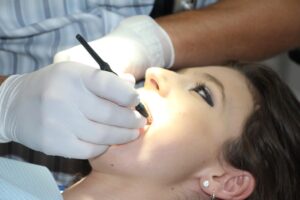The cost of orthognathic surgery can vary significantly depending on the complexity of the jaw and facial structure issues being addressed. Given the wide range of conditions this surgery can address, this post will explain the factors influencing the cost of orthognathic surgery and the associated risks you should be aware of to make an informed decision.
What is Orthognathic Surgery?
Orthognathic surgery is a procedure that involves repositioning the jawbones to achieve a harmonious bite. This surgery ensures that the upper and lower teeth come together evenly. Since it alters the shape of the facial skeleton, any necessary soft tissue adjustments are performed after the skeletal changes are completed.
This type of maxillofacial surgery aims to create a harmonious and symmetrical facial structure. While less widely known, it is ideal for treating conditions such as sleep apnea, skeletal malocclusions, open bites, facial asymmetries, and temporomandibular joint (TMJ) disorders. It is also used to harmonize facial features and address issues that cannot be corrected with traditional orthodontic treatment.
Orthognathic surgery is performed entirely inside the mouth, leaving no visible facial scars. Given its invasive nature, recovery often involves a period of orthodontic treatment following surgery, known as the “surgery-first” protocol.
Today, orthognathic surgery is part of a broader approach called orthofacial surgery, which aims to correct functional malocclusions while addressing facial imbalances commonly associated with them. This approach combines orthognathic surgery with procedures such as rhinoplasty or genioplasty to achieve optimal aesthetic and functional results.
Orthognathic surgery is also highly beneficial for patients with sleep apnea, with maxillomandibular advancement surgery combined with genioplasty proving curative in over 95% of cases.
Recent advances in surgical planning, rigid fixation, anesthetic techniques, and postoperative care have made it possible to perform orthognathic surgery as an outpatient procedure, with hospital stays typically lasting less than 24 hours. Virtual surgical simulations also allow for precise pre-surgical planning and help ensure patient expectations are met.
What is the Cost of Orthognathic Surgery?
The cost of orthognathic surgery depends on several factors, including whether it is monomaxillary (involving only one jawbone) or bimaxillary (involving both the upper and lower jawbones). The complexity of the surgery affects the price, with bimaxillary procedures generally being more expensive.
In addition, complementary procedures are often performed alongside orthognathic surgery to enhance facial harmony. These can include mentoplasty, implant placement, wisdom tooth extraction, or lipofilling to augment different facial areas.
Costs to Consider in Orthognathic Surgery
- Clinic Costs: This includes anesthesia, medical supplies, and operating room fees. These costs can range from €1,000 for outpatient treatments to €2000 for treatments requiring hospital admission.
- Surgery Costs: Plaster models and the creation of surgical splints, necessary for precise movement of the jaws during surgery, typically cost around €600, depending on the complexity of the procedure.
- Rigid Fixation Costs: Titanium or resorbable mini-plates and screws are used to stabilize the jaws. The cost ranges from €800 for monomaxillary surgery to around €1,100 for bimaxillary surgery. If a mentoplasty is performed, an additional €200 may be required.
- Surgical Fees: The fees depend on the surgeon and their team. In Spain, bimaxillary surgery typically costs between €10,500 and €15,000, depending on whether complementary treatments like rhinoplasty or dental implants are included. Monomaxillary surgery costs between €7,500 and €9,000.
- Scans and X-rays: Preoperative imaging (CT scans or X-rays) may be required for detailed surgical planning, which could add to the overall cost.
Can Orthognathic Surgery Be Covered by Social Security?
In public healthcare systems, there is often significant demand for treating more urgent conditions, such as cancer. As a result, orthognathic surgery may have long waiting times, often exceeding several years. It is advisable to consult healthcare providers about potential options.
Risks of Orthognathic Surgery
While orthognathic surgery has become a common and highly effective treatment within maxillofacial surgery, it is not without risks. These include:
- General Anesthesia Risks: In healthy individuals, the risk associated with general anesthesia is extremely low (approximately 1 in 850,000 cases). Most complications, such as allergic reactions or arrhythmias, can be managed by experienced anesthesiologists.
- Unknown Medical Conditions: Undiagnosed medical conditions, such as coagulation disorders, can present risks. Proper preoperative screening can help mitigate these risks.
- Nerve Injuries: Temporary alterations in the sensation of the chin or lips are common, but permanent nerve damage is rare. The skill and experience of the surgeon are crucial in minimizing these risks.
- Vascular Injuries: Bleeding during surgery is rare, but can occur due to anatomical variations in blood vessels.
- Stability Issues: Improper fixation of the jaws during surgery can lead to malocclusions or relapse, especially in patients with previous surgeries, such as those with cleft palate repairs.
- Poor Aesthetic Results: Inadequate planning or communication between the surgeon and patient can lead to unsatisfactory results. Reoperation may be necessary in such cases.
Conclusion
Orthognathic surgery is a transformative treatment that can significantly improve facial aesthetics and functional issues like malocclusion or sleep apnea. However, it is essential to choose a skilled and experienced surgical team to minimize risks and achieve the desired results.
If you’re considering orthognathic surgery, Clínica Birbe offers consultations and treatment options tailored to your needs. Contact us at:
- Email: clinica@birbe.org
- Phone: +34 93 212 47 37
- WhatsApp: +34 626 852 363
For international patients, video consultations with Dr. Birbe are available.
To learn more, visit us on social media: Facebook, Instagram, Twitter, YouTube.



